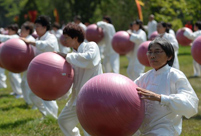 Amphibious armored vehicle unit conducts open sea drill
Amphibious armored vehicle unit conducts open sea drill
 Water relay in Henan
Water relay in Henan
 Ethnic culture feasts eyes of travelers
Ethnic culture feasts eyes of travelers
 80 security dogs assembled in Nanjing police dog training base
80 security dogs assembled in Nanjing police dog training base
 Graffiti artists paint on street walls in Xinjiang
Graffiti artists paint on street walls in Xinjiang
 Story of ceramic artist Zhang Lingyun
Story of ceramic artist Zhang Lingyun
 Magic summer night dream in Hongyuan
Magic summer night dream in Hongyuan
 Incredible creatures in headwaters drainage region of Lancang River
Incredible creatures in headwaters drainage region of Lancang River
 The future of rock n' roll seen in young rockers in China
The future of rock n' roll seen in young rockers in China
 Magnificent Yanziya Cliff
Magnificent Yanziya Cliff
Elderly people rest on a hill in Abuluoha village, Liangshan Yi Autonomous Prefecture, Sichuan Province. Photo: Li Hao/GT
Lin Muwen took a shower, then put on a clean set of clothes. Lin, 69, sat in the middle of the main room of his house, burned an offering of paper money for himself, and drank half a bottle of pesticide. The fire burned down, and the old man never stood up again.
"He had planned this suicide for a long time," one of his fellow villagers said. Liu was from Jingshan county, not far from Wuhan, the capital of Hubei Province. Many of the villagers speculated that it was the rupture between Liu and his daughter-in-law that led to his suicide.
"He thought his children wouldn't even buy paper money for him after his death," the villager said. "So he thought that this was a 'respectable' way to die." Traditionally in China, people burn paper money as a way of paying respects to departed ancestors.
The story of Liu Muwen was just one of many gathered by Liu Yanwu, a lecturer in Wuhan University's sociology department, who arrived in Jingshan county in 2008 leading a team researching suicide among elderly people in China's rural areas. During the past six years, he has visited more than 40 villages in 11 provinces including Hubei, Shandong and Guizhou. He found that Lin's tragedy was not an isolated case, and that all too many small villages housed "horrifying" stories of suicide.
According to data collected by Liu, the suicide rate among elderly residents of rural areas has increased in recent years, while a report published by the University of Hong Kong showed that the China's overall suicide rate has declined.
As Liu puts it, "These elderly people have no other choice than suicide. Perhaps this is the particular way they have chosen to relieve their misery in an aging society."
Nothing out of the ordinary
Lin's suicide didn't create many waves in his village. His son was surprisingly calm and did not blame his wife, as Liu Yanwu had thought he might.
Liu said suicide was considered normal and reasonable in the village. Villagers took it for granted, and minimized discussion of Lin's death out of respect for his son's feelings.
Even doctors in the area had adopted the same blasé attitude toward suicide.
This shocked Liu and his colleagues. "The more normal they find it, the more chilling we find it." Yang Hua, Liu's colleague, said.
Yang said they attended one funeral for an elderly village resident who had committed suicide, only to find his next of kin talking jovially. While the researchers were infuriated, the villagers seem to have already accepted the "cruel" fact of the suicide and moved on.
Liu Wuyan would gradually come to discover that Lin's suicide was not particularly cruel compared with others he would witness, some of which he called "beyond imagining."
One couple from Shanxi Province was abused by their son and his wife. They refused the elderly couple food and beat them. In the end, the couple jumped headfirst into the household cistern. "They were determined to die," Liu said.
"Some villagers told me about the miserable lives of the village's older people in a relaxed tone," Liu said with a sigh. "I often want to escape from this world because I feel like I don't belong here."
Suicide or murder?
Liu and his colleagues were even more shocked by cases that went beyond simple suicide.
Yang Hua tells the story of one elderly couple who drank pesticide to commit suicide. The wife died, while the husband survived. But his relatives didn't send him to hospital. The next day, the family held a funeral for the wife and waited for the husband to pass on, at which point the family took advantage of the arrangements for the prior funeral to hold another, more convenient, funeral.
Another story went like this: A migrant worker asked for seven days' leave to look after his critically ill father. After two days, when the old man still hadn't died, his son was furious because he had expected to hold a funeral for his father during his seven days' leave. Eventually, the old man committed suicide. After the funeral, the son went back to work as usual.
These examples point to a baffling situation wherein a traditionally Confucian society structured on filial piety and hierarchical culture easily abandons the elderly it supposedly reveres, and the collapse of ethical norms in the face of the modern society.
Commentators have pointed out a number of causes, chief among them economic development's marginalization of rural society, victimizing the elderly in the blind pursuit of materialism and efficiency.
The source of the problem, according to a commentary in the Nandu Daily newspaper, is a "deformed society" in which traditional order and values have been destroyed in the transition to a modern society.
"The modern world stresses markets and competition, and pays particular attention to maximizing family interests." Liu explained. "When family members began to think in a market mentality, they use money to value family relations."
Many villagers were willing to walk Liu through the calculations: Suppose 30,000 yuan ($4,872) can cure an elderly person of their illness. If that person can live for 10 years more, then spending the money is worth it; if they can't, it's not.
Even many seniors found such calculations reasonable.
"Most of them take into consideration the future of their offspring," Yang believed. "They don't want to become a burden on their kids."
Rather than committing suicide at home, some go to empty lots or creek bottoms to avoid arousing their children's suspicion. Others don't want to commit suicide right after quarrelling with their kids, and so wait until things calm down before doing the deed. If a couple decides to commit suicide together, they avoid doing it on the same day or in the same room, so as not to negatively impact their family members.
Liu Yanwu believed that suicide is a last resort for the elderly people who choose to carry it out. "Their emphasis on their kids reflects their desperation," Liu said.
He Xuefeng, Liu Wuyan's supervisor and director of the Research Center of China Rural Governance at Huazhong University of Science and Technology, calls these suicides "trans-generation exploitation," saying that these elderly people worked hard to help their kids get married and look after their grandchildren; once they get old and lose the ability to work, they receive little in return, whether materially or emotionally.
"When all of their value has been exploited, they become useless and can only wait for death," He said.
 |
 Beijing policewomen posters become a hit
Beijing policewomen posters become a hit Armored regiment trains on the sea
Armored regiment trains on the sea Children spend 'Father's Day' with dads at work
Children spend 'Father's Day' with dads at work 'Pan Da' appear in Shanghai World Financial Center
'Pan Da' appear in Shanghai World Financial Center Champions take selfies on podium
Champions take selfies on podium National Fitness Day celebrated around China
National Fitness Day celebrated around China Traditional culture colors summer vacation
Traditional culture colors summer vacation Young athletes fighting for their dreams
Young athletes fighting for their dreams 68 meters high thermometer in Shanxi, called ‘fighter’ of thermometers
68 meters high thermometer in Shanxi, called ‘fighter’ of thermometers 22-year-old veteran travels around China
22-year-old veteran travels around China
 Night scenery of pagoda forests
Night scenery of pagoda forests China suffers from hot summer
China suffers from hot summer 48 hours after super Typhoon Rammasun
48 hours after super Typhoon Rammasun German pianist plays mid-air ‘magic carpet’ show over Munich Airport
German pianist plays mid-air ‘magic carpet’ show over Munich Airport
 China's manned deep-sea submersible conducts dive in Pacific Ocean
China's manned deep-sea submersible conducts dive in Pacific Ocean
Day|Week|Month